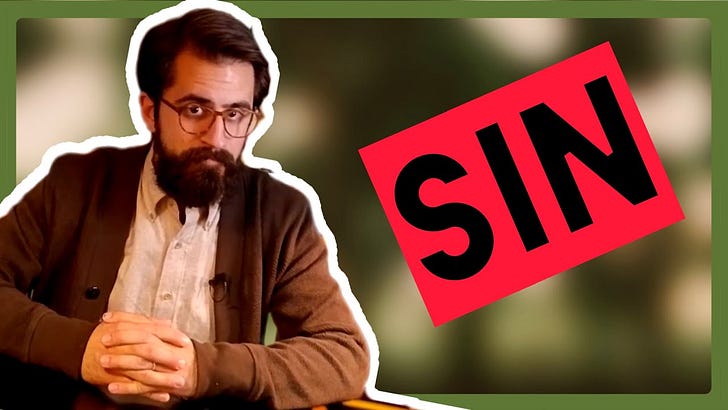I’ve recently been taking a stab at YouTube in addition to Substack. Please check out my channel and subscribe.
My most recent “made-for-YouTube” content was a video, “Is Temptation Sin?”
Provoked by the recent tome, Ruined Sinners to Reclaim: Sin and Depravity in Historical, Biblical, Theological, and Pastoral Perspective, I had to reply to its contributors’ claim that temptation, or concupiscence, is sin. I previously addressed this topic in my series on faith and sexuality.
Enjoy watching or listening, or read the transcript, with additional links and citations, below.
Is Temptation Sin?
No.
A lot of Christians have recently been arguing that temptation is sin, that the desires within us that give rise to sin are already themselves sin.
I've got a whole tome here from a bunch of theologians that argues this point. To quote them, “Being attracted to sin and sinning are distinct but inseparable parts of the sin-guilt complex. The Reformed tradition has always held that the corruption of nature is itself sin.”
Influential conservative Christian voices have been arguing this, and denominations like the PCA and the SBC have even begun to exclude people from ministry who are tempted in certain ways.
1. Morality Is Not a Rigged Game
But here's the thing: Morality is not a rigged game or a catch-22. What God asks of us is obedience in the face of temptation, not freedom from temptation.
Christ himself was tempted, but without sin. Hebrews 4.15 says:
“For we do not have a high priest who is unable to sympathize with our weaknesses, but one who, in every respect, has been tempted as we are, yet without sin.”
To be tempted is something human. What matters, as far as sin and righteousness are concerned, are our will, our intention, and our choice. That is all we can control.
We can't control the hand of cards we are dealt, the temptations to which God has ordained that we be subject. What we can do is decide how to play the cards God has given us.
2. Thought-Action Fusion and Christian OCD
Psychologists identify a major symptom of OCD as thought-action fusion fusion is a cognitive distortion happens when a person thinks that having a thought or a desire about a negative event makes that thing more likely to occur or is morally equivalent to having done it.
My wife is a Christian counselor. She encounters patients who, especially because of Christian teaching, are subject to this idea. They obsess over the little thoughts or desires they had that make them think, “I must be a murderer or somebody with bad desires,” etc.
But this is a symptom of OCD. It's a distortion. It's something they need to overcome.
(For more on thought-action fusion, check out Anna’s and my joint article, “Are Thoughts Sins?”)
And as she's found, the right solution for them is not to obsess over every thought, desire, and temptation and identify that as sin and repent over it, but instead to say, “All I can focus on is what I do with it. I'm not going to repent over things that I didn't choose. I'm going to move forward and not feel guilty over things I cannot control.”
3. Theological Objections
Now, Christians, and especially theologically informed ones, often raise a lot of kind of picky objections to the idea that temptation is not sin:
“Jesus said that lust is sin.”
“Original sin and concupiscence,” (an old-fashioned word for desire) “are sin.”
“Distinguishing temptation from sin is Catholic.”
But two things here:
Is Sexual Temptation Sin?
First of all, actually Jesus did not say that sexual desire itself is sin, just being tempted by something erotic or sexual. Instead, Matthew 5:27-28 says this:
“You have heard it said, you shall not commit adultery. But I say to you that everyone who looks at a woman with lustful intent has already committed adultery with her in his heart.”
Jesus doesn't condemn having sexual temptations. He condemns … this:
Jesus doesn't say that having unbidden and unchosen temptations and desires is sin. He says that intentionally looking at someone in order to lust after them is sin. He's saying that not only the overt, completed outward external action is sin, but the things that we do, yes, within our heart, but also the the steps in between on the way to fully carrying out a sin - sin and our intention and our will are all along the way.
For example, just having sexual desires, which is the natural outcome of puberty, that's not sin. That's the way God made us. We have no reason to believe that Jesus didn't go through puberty. Jesus himself would have been subject to sexual temptation, without sin.
(Read my article, “Is Sexual Desire Natural?” for more on that subject, and the example of an asexual individual whose “body is a puberty-blocker.”)
Is Original Sin “a Sin?”
And the second thing:
Yes, original sin, according to the theological tradition, which includes our sinful desires, which includes the corruption of our nature, this is called “sin.” We put that label on it. The desires that arise from it are tainted with sin. They're impure.
But theologians still distinguish “original sin” from “actual sin,” the actual acts we commit in violation of the law of God.
Are our desires and temptations a result of original sin, an effect of the fall that Adam wouldn't have been subject to? Partly. There's some new things thrown in the mix. But Adam himself was tempted. He wasn't already subject to original sin. And Christ himself is tempted, yet without sin.
The point of the doctrine of original sin is that, we weren't just sinless and perfect and then one day said, “Nah, I think I'm gonna disobey God. Nah, I think I'm gonna sin.” No, sin has already worked into our nature and then its working out is in our actions.
Likewise, sin isn't something we can just stop, like, “I had those lustful desires and temptations. … I'm just gonna stop.” We can't do that. Original sin means our nature itself is already bent and twisted in certain ways.
The point of the doctrine of original sin is that sin isn't just what we do. It's also a condition we're born into.
We were all “born this way.”
4. A Choice for Christians
And see, there are two different ways that you can take the doctrine of original sin.
One has been common recently in conservative Christian circles: Original sin is a reason to make people feel guilt and shame even over the things they can't choose, not only for their actions and their choices, but even for their desires and temptations.
That's one thing you could do with the doctrine.
But a different thing you could do actually is suggested by secular philosopher, Alain de Botton. Original sin, he says, is a reason to treat other people with mercy. (See this video, beginning at 12:14.)
“The Christian concept of ‘original sin’ has many dark undertones and associations. But, really, what it’s trying to get you to take on board is that, from the very beginning, there’s something a bit wrong with you.” (Laughter)
Contemporary people who are secular and the ancient Pelagians neglected this deep truth that there's already something wrong with us. That's the merciful thing that original sin recognizes.
Sin isn't just the things that we choose overtly, trying to disobey the law of God. Sin has worked into us. It's motivated. It doesn't come out of nowhere.
And so we have a choice: As we think about temptation, sin, original sin, are we Christians going to get more hardcore on telling sinners how sinful they are, even just to be tempted by sin?
Or are we going to help people find a way out, a way free from shame?
Can we, like Jesus Christ, sympathize with human weakness? Can we sympathize with temptations, recognizing that Jesus Christ himself was tempted in every way as we are, yet without sin?
Before You Go:
My Music:
My Online Course:
What Is Theological Epistemology? An Introduction
I’m excited to offer my first course under the auspices of The Natural Theologian. The title and topic of the course is “Theological Epistemology,” the question of how Christians know and how God relates to human knowledge.
My YouTube Channel
(Click on image for link)








As someone who shares the context into which you're intervening with this post, I fully support how you're pushing back against this "Christian OCD" which is constantly wringing its hands and examining every little thought and desire. It over-identifies us with our thoughts and desires, as though we control them or they *are* us in a straightforward way, but I think the situation is much more complex than that.
However, I want to note that I don't think reason or theological precision can avail much for the one wracked by guilt about their temptations. Psychoanalysis talks about the function of the super-ego, the condemning voice of the Law which constantly bombards us with commandments. Žižek emphasizes how the super-ego is actually designed to be a losing game, because the harder you try to do what the super-ego commands, the more guilty you feel. The more sin you start seeing everywhere, including yourself, and the more impossible it becomes to obey the Law's strictures. You sink deeper and deeper into the mire of condemnation.
So, I would add that as a next step or a supplement to what you're saying, and point out that the good news of God's salvific work to give us fullness of life through His Son and the Spirit offers a way out of the super-ego game, a path which quiets the voice of the Law, and which enables us to live from a place of excess and overflow, rather than deficit and desperation.
I have been a little sympathetic to the idea that concupiscence is technically "sin", though not "a sin" (or "actual sin"), but reading the Wedgeworth chapter actually gave me more of Augustine's language to say that it can be called sin or sinful through metonymy, and, yet, at the end of the day, we should just stop talking about concupiscence and use plain language.
Borrowing from Luther's metaphor, would you agree with this? That responding to all tempting thoughts/attractions as sin (not merely as sinful, via metonymy) is an overly hard burden to bear, especially for those with weaker mental-spiritual constitutions—we would not only need to repent for the bird that builds a nest on our head, but also for every bird that briefly lands on our head, or even for the fact that we have a head that a bird may be prone to land on!**